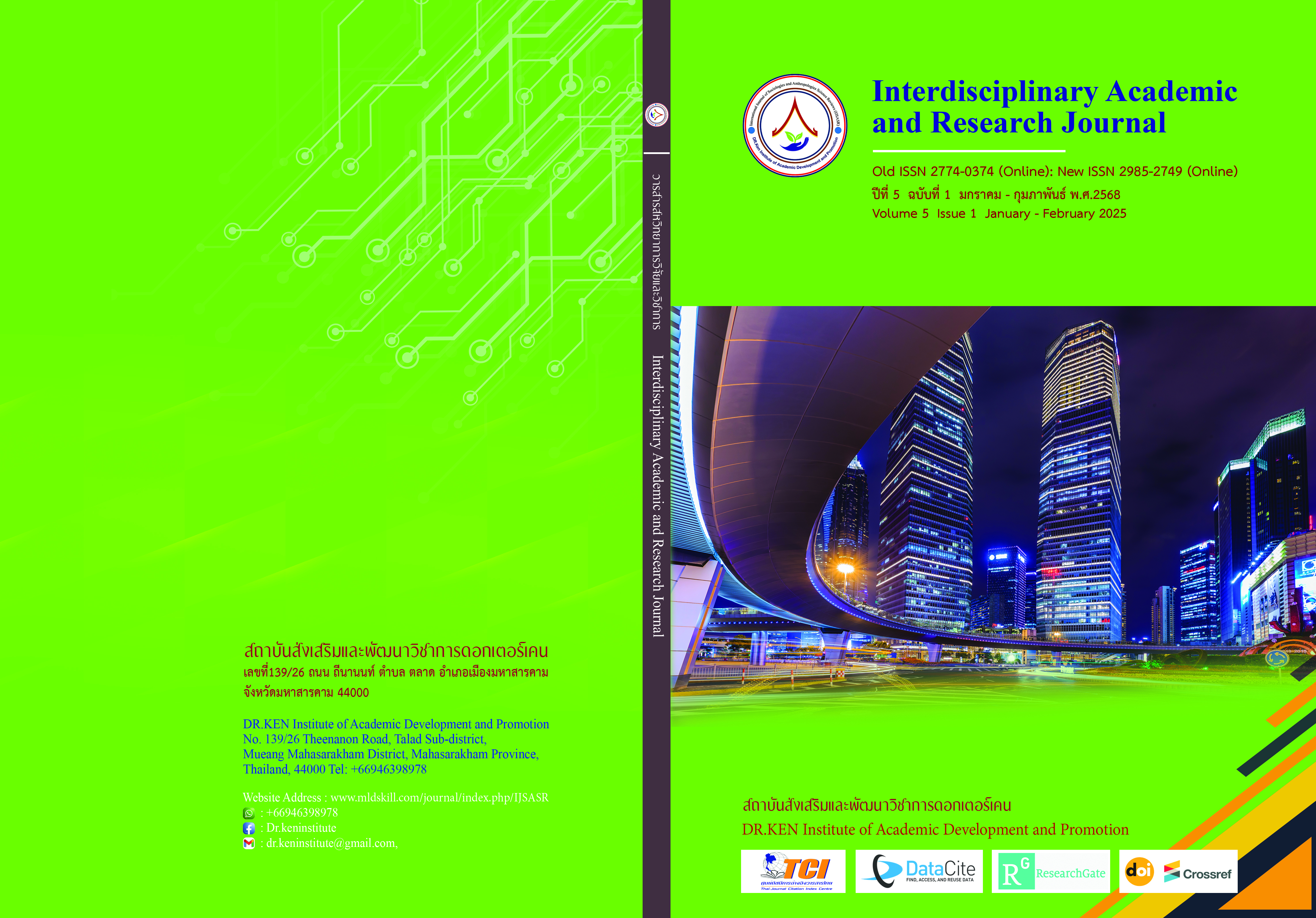Good Governance Principles to Develop Law in the Performance of Duties and Exercise the Authorities of the Anti-money Laundering Commission and Officers
DOI:
https://doi.org/10.60027/iarj.2025.280626Keywords:
Good governance, Exercise of duties and powers, Anti-Money Laundering CommissionAbstract
Background and Aims: This research studies and investigates the principle of good governance in order to develop a law for the performance of duties and exercise of power of the Anti-Money Laundering Committee and its officials. The objectives are to study 1) concepts, principles and theories on the application of good governance in the performance of duties and exercise of power of the Anti-Money Laundering Committee and its officials; 2) legal measures on the application of good governance in the performance of duties and exercise of power of the Anti-Money Laundering Committee and its officials in foreign countries and in Thailand; 3) analyze the application of good governance in the performance of duties and exercise of power of the Anti-Money Laundering Committee and its officials; and 4) recommend the enactment of a law on the application of good governance in the performance of duties and exercise of power of the Anti-Money Laundering Committee and its officials.
Methodology: This research used qualitative research methods, consisting of document research and in-depth interviews using open-ended questionnaires. The quality of the data was verified by using interview data and focus group discussions, which are a qualitative data collection process that allows the target population to be a specific group that is involved or has a stake, from a group of 6 personnel of the Anti-Money Laundering Office, 3 government officials, 3 academics, and 3 lawyers to brainstorm on research issues. Then, the specific population groups exchanged information and experiences according to the issues specified by the researcher and analyzed the data until the research results were obtained as specified in the objectives.
Results: The research results found that 1) From the use of concepts, principles and theories in analyzing the principles of good governance to develop laws in the performance of duties and exercise of power of the Anti-Money Laundering Committee and officials, although the Anti-Money Laundering Act B.E. 2542 allows the Anti-Money Laundering Committee to perform various actions, it is difficult to define clear roles, duties and powers, and leads to the use of discretion, resulting in discrimination and violation of basic human rights. 2) The examination of the exercise of discretion of the Anti-Money Laundering Committee found that there were no criteria that specified a mechanism to control and examine the exercise of discretion of the Anti-Money Laundering Committee. In addition, the exercise of such power does not have the status of an administrative order, making it impossible to object, object or appeal to any organization, including the Administrative Court. 3) The interpretation and enforcement of the law in practice that affects the performance of officials found that it was used as a channel to delay the case and was used as a tool for the government to intervene in the exercise of power. 4) The model law on the principles of good governance in the performance of duties and exercise of power of the Anti-Money Laundering Committee and officials’ The legal structure consists of (1) definitions of terms, (2) Section 1, Anti-Money Laundering Board, (3) Section 2, officials, and (4) Section 3, penalties.
Conclusion: This research study has developed the law for the performance of duties and exercise of powers of the Anti-Money Laundering Board to be in accordance with the principles of good governance and the officers can perform the duties and exercise the powers of the Anti-Money Laundering Board and its officers more legitimately.
References
ชำนาญ ชาดิษฐ์, สุขสมัย สุทธิบดี, อุดม รัฐอมฤต, อุทัย อาทิเวช. (2564). การปรับปรุงกฎหมายเกี่ยวกับการฟอกเงินของไทย. KASEM BUNDIT JOURNAL, 22(2), 1–12. Retrieved from https://so04.tci-thaijo.org/index.php/jkbu/article/view/253962
บรรเจิด สิงคเนติ, (2560). หลักความเป็นอิสระและหลักความเป็นกลางในการปฏิบัติหน้าที่ของ กสม.. วารสารวิชาการสิทธิมนุษยชน, 2 (1), 153-182.
พระนัฐทร จนฺทปญโญ (พาลี) และ จักรี ศรีจารุเมธีญาณ, (2564). การบริหารงานตามหลักธรรมาภิบาล. วารสารสหวิทยาการวิจัยและวิชาการ, 1 (6), 47-56. DOI: https://doi.org/10.14456/iarj.2021.29
พีรพล ไทยทอง, (2560). ธรรมาภิบาลกับการบริหารงานภาครัฐยุคใหม่ไทยแลนด์ 4.0. วารสาร มจร. สังคมศาสตร์ปริทรรศน์. 6 (2), 607-616.
ยุทธนา ปราณีต; อภิญญา ฉัตรช่อฟ้า, บวร ขมชุณศรี, กาญจนา ดำจุติ, ปนัดดา รักษาแก้ว. (2563). อำนาจอธิปไตยกับแนวคิดว่าด้วยเจ้าของอำนาจและการแสดงออกของประชาชน. วารสาร มจร. สังคมศาสตร์ปริทรรศน์, 9 (2), 304-314.
Jullum, M., et al. (2022). Detecting money laundering transactions with machine learning. Journal of Money Laundering Control, 23, 173–186. doi.org/10.1108/JMLC-07-2019-0055
Tromme, M., et al. (2020). Enrique Pen˜a Nieto’s National Anti-Corruption Commission and the Challenges of Waging War against Corruption in Mexico. International Relations and Diplomacy. 8, 566-567.
Downloads
Published
How to Cite
Issue
Section
License
Copyright (c) 2025 Interdisciplinary Academic and Research Journal

This work is licensed under a Creative Commons Attribution-NonCommercial-NoDerivatives 4.0 International License.
Copyright on any article in the Interdisciplinary Academic and Research Journal is retained by the author(s) under the under the Creative Commons Attribution-NonCommercial-NoDerivatives 4.0 International License. Permission to use text, content, images, etc. of publication. Any user to read, download, copy, distribute, print, search, or link to the full texts of articles, crawl them for indexing, pass them as data to software, or use them for any other lawful purpose. But do not use it for commercial use or with the intent to benefit any business.
















.png)


